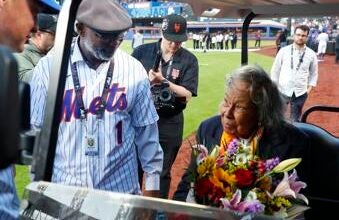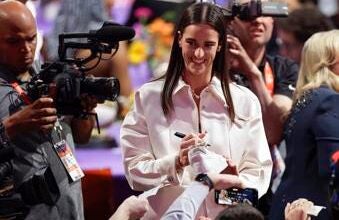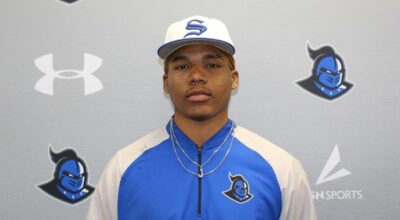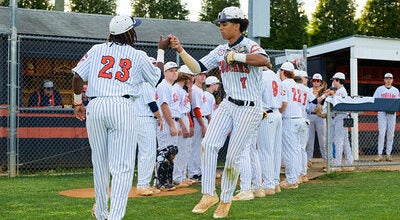Published 12:00 am Monday, August 12, 2013
By Mike London
mlondon@salisburypost.com
SALISBURY — Thirteen years into the Hall of Fame process, the Salisbury-Rowan Hall committee is still inducting All-America athletes and legendary coaches that you might have expected to get the nod on the first ballot.
But the Salisbury-Rowan Hall of Fame didn’t get started until 2001, so the committee has played a game of catch-up with many decades and hundreds of deserving sports legends ever since.
It caught up with six more on Sunday at the Salisbury Civic Center.
Committee chairman Wilson Cherry directed the proceedings as 1970s stalwarts Greg Poole and Justus Everett and 1980s phenoms Antione Sifford and Brian Boltz stepped forward to receive Hall of Fame plaques, thank families and coaches and make short speeches.
You can make a case that honors for all four were overdue, but they accepted with the sort of grace and humility that modern athletes can learn from. Poole, in particular, seemed genuinely amazed that his deeds hadn’t been forgotten.
Bill Peeler, one of the coaching greats, not just for this area, but for all of North Carolina, was posthumously inducted. Former Post sports editor and committee member Ed Dupree reeled off his coaching stats, and Peeler’s widow Eleanor spoke eloquently on his behalf.
“Bill was asked one time what athletics had done for him,” she recalled. “He said athletics gave him a broken nose and two bad knees — and an education.”
Peeler used that education to touch thousands of lives at Davie County High.
The late Jesse Corry was inducted as this year’s Horace Billings Lifetime Achievement Award winner.
Corry, who passed away in 2008 at age 73, wore many hats — teacher, coach, counselor, personnel manager, mentor, college referee, fundraiser, humanitarian — in decades of dedicated service.
One of the Livingstone graduate’s legacies is Salisbury’s American Red Cross building, for which his fundraising was instrumental.
Clair Corry spoke for her late husband and summed his well-lived life up perfectly with one lovely sentence.
“Jesse always saw good in everybody,” she said.
With the exception of not including a female athlete, this is almost a perfectly balanced Hall of Fame class.
Corry’s ties were to Livingstone and to J.C. Price and Dunbar, all-black schools in the time of segregation.
Peeler’s ties were to the storied Bill Ludwig era at Boyden High, to Catawba and to Davie County.
Poole represents the golden era for South Rowan athletics, while Everett starred in Salisbury at a time when Boyden and J.C. Price were joining forces to produce an integrated athletic dynasty that ruled the early 1970s.
Boltz was a tremendous baseball pitcher at East Rowan, a school long revered for its baseball, and the Atlanta Braves draft pick’s name ranks high in all the all-time categories for Catawba and Rowan County American Legion baseball.
Sifford was the face of North Rowan athletics at a time when the Cavaliers were awesome in football and basketball, so that area of the county is represented as well.
In a handful of paragraphs, it’s not possible to tell enough about Sunday’s inductees, so a few highlights will have to do the job.
Peeler was a tough athlete at Boyden in the late 1940s. He was a terror on offense and defense for the football team.
He blocked for Hall of Famer Jerry Barger, kicked PATs and blocked lots of punts. He was named to the Shrine Bowl roster and played in the East-West Game.
He was outstanding at Catawba as a baseball catcher and football lineman and earned seven letters.
As good an athlete as Peeler was, it was his coaching career that made him extra special. His 445-220 record with Davie girls basketball will have people shaking their heads for a long time.
To put that number in perspective, only one coach (Hall of Famer Jesse Watson) has topped 300 girls basketball wins in Rowan’s long history.
Everett, who starred as a center at N.C. State, modestly credits Boyden High teammate Robert Pulliam (a Hall of Famer who died in 2007) with making him a college football player.
“Not a day goes by that I don’t think about Robert, and how hard he hit me in practice every day with (line coach) Charlie Little egging him on,” Everett said with a chuckle.
After facing Pulliam, who went on to a stellar career at Tennessee, the ACC was not that big a deal for Everett.
“In four years at N.C. State, no one ever hit me as hard as Robert did in high school,” reported Everett, who was a two-time All-ACC center.
A brilliant student, Everett was a first team Academic All-America in 1973 and 1974 and he ranked first in his class in N.C. State’s school of engineering.
Boltz came out of nowhere to be a second-round draft pick. He grew up wanting to be a football player, and he was told more than once he wasn’t big enough or strong enough or good enough to be a standout athlete.
After late Hall of Famer Jim DeHart gave him a shot, Boltz became an All-America hurler at Catawba and an overpowering pitcher for the Rowan Legion team, fanning 24 in a nine-inning game. Hall of Fame broadcaster Howard Platt declared Sunday that Boltz is as good as he’s seen.
Boltz credits big-leaguer Bob Shaw with making the difference. Shaw showed him a new grip and asked him to try it. To say the least, the adjustment worked. Boltz added movement and velocity.
“The advice he gave me allowed me to stop working around hitters and start going after them,” Boltz said.
Sifford was a tremendous talent — All-State in football and basketball and county player of the year in both.He was a key part of two teams that won it all in basketball.
In 1986, he scored 25 points in North’s 2A title-game win over Ayden-Grifton.
In North’s 8-0 postseason roll that season, Sifford averaged 24 points per game.
Sifford had 21 points and nine rebounds as N.C. Central beat Southeast Missouri for the D-II national title in 1989.
The impact Poole had at South Rowan could be gauged by the amount of longtime South coaches that joined his family at his table on Sunday.
Poole was a great athlete at South —player of the year in baseball as well as football.
His dream was to go to UNC, although the Tar Heels were lukewarm about him. He was the least hyped member of his recruiting class because UNC coaches didn’t believe he was fast enough for DB or running back and not big enough for other positions.
He proved the world wrong, becoming an All-ACC cornerback and a record-setting punt returner. Open the centerfold of the 1982 Carolina football guide and you’ll see Poole in full sprint and in full color on his way to a pick-6 against Wake Forest.
He was a tremendous college player, but like the rest of Sunday’s inductees he was almost bashful about it.
“My success was about a lot of other people and a lot of breaks,” Poole said.
Quite a Hall of Fame class.





